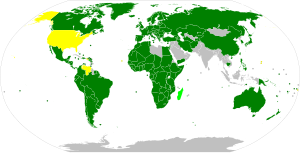
The Vienna Convention on Diplomatic Relations of 1961 is an international treaty that defines a framework for diplomatic relations between independent countries. Its aim is to facilitate "the development of friendly relations" among governments through a uniform set of practices and principles; most notably, it codifies the longstanding custom of diplomatic immunity, in which diplomatic missions are granted privileges that enable diplomats to perform their functions without fear of coercion or harassment by the host country. The Vienna Convention is a cornerstone of modern international relations and international law and is almost universally ratified and observed; it is considered one of the most successful legal instruments drafted under the United Nations.
The Protocol for the Prohibition of the Use in War of Asphyxiating, Poisonous or other Gases, and of Bacteriological Methods of Warfare, usually called the Geneva Protocol, is a treaty prohibiting the use of chemical and biological weapons in international armed conflicts. It was signed at Geneva on 17 June 1925 and entered into force on 8 February 1928. It was registered in League of Nations Treaty Series on 7 September 1929. The Geneva Protocol is a protocol to the Convention for the Supervision of the International Trade in Arms and Ammunition and in Implements of War signed on the same date, and followed the Hague Conventions of 1899 and 1907.

The Outer Space Treaty, formally the Treaty on Principles Governing the Activities of States in the Exploration and Use of Outer Space, including the Moon and Other Celestial Bodies, is a multilateral treaty that forms the basis of international space law. Negotiated and drafted under the auspices of the United Nations, it was opened for signature in the United States, the United Kingdom, and the Soviet Union on 27 January 1967, entering into force on 10 October 1967. As of March 2023, 113 countries are parties to the treaty—including all major spacefaring nations—and another 23 are signatories.
An asylum seeker is a person who leaves their country of residence, enters another country and applies for asylum in that other country. An asylum seeker is an immigrant who has been forcibly displaced and might have fled their home country because of war or other factors harming them or their family. If their case is accepted, they become considered a refugee. The terms asylum seeker, refugee and illegal immigrant are often confused.

The Vienna Convention on the Law of Treaties (VCLT) is an international agreement that regulates treaties among sovereign states; the VCLT is a codification of customary international law and state practice concerning treaties.
Refugee law is the branch of international law which deals with the rights and duties states have vis-a-vis refugees. There are differences of opinion among international law scholars as to the relationship between refugee law and international human rights law or humanitarian law.
The right of asylum is an ancient juridical concept, under which people persecuted by their own rulers might be protected by another sovereign authority, like a second country or another entity which in medieval times could offer sanctuary. This right was recognized by the Ancient Egyptians, the Greeks, and the Hebrews, from whom it was adopted into Western tradition. René Descartes fled to the Netherlands, Voltaire to England, and Thomas Hobbes to France, because each state offered protection to persecuted foreigners.
The Protocol Against the Smuggling of Migrants by Land, Sea and Air, supplementing the Convention against Transnational Organised Crime, was adopted by the United Nations General Assembly in 2000. It is also referred to as the Smuggling Protocol. It is one of the three Palermo protocols, the others being the Protocol to Prevent, Suppress and Punish Trafficking in Persons, especially Women and Children and the Protocol against the Illicit Manufacturing and Trafficking in Firearms, Their Parts and Components and Ammunition.
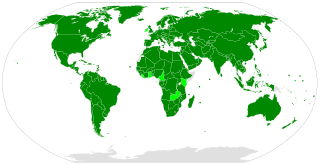
The Optional Protocol on the Sale of Children, Child Prostitution and Child Pornography is a protocol to the Convention on the Rights of the Child and requires parties to prohibit the sale of children, child prostitution and child pornography.
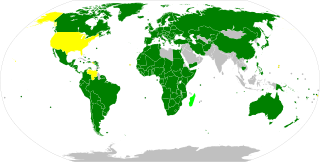
The Convention Relating to the Status of Refugees, also known as the 1951 Refugee Convention or the Geneva Convention of 28 July 1951 is a United Nations multilateral treaty that defines who a refugee is and sets out the rights of individuals who are granted asylum and the responsibilities of nations that grant asylum. The Convention also sets out which people do not qualify as refugees, such as war criminals. The Convention also provides for some visa-free travel for holders of refugee travel documents issued under the convention.

The Vienna Convention on Consular Relations is an international treaty that defines a framework for consular relations between sovereign states. It codifies many consular practices that originated from state custom and various bilateral agreements between states.
Non-refoulement is a fundamental principle of international law that forbids a country receiving asylum seekers from returning them to a country in which they would be in probable danger of persecution based on "race, religion, nationality, membership of a particular social group or political opinion". Unlike political asylum, which applies to those who can prove a well-grounded fear of persecution based on certain category of persons, non-refoulement refers to the generic repatriation of people, including refugees into war zones and other disaster locales. It is a principle of customary international law, as it applies even to states that are not parties to the 1951 Convention Relating to the Status of Refugees or its 1967 Protocol. It is also a principle of the trucial law of nations.

The International Convention for the Protection of All Persons from Enforced Disappearance (ICPPED) is an international human rights instrument of the United Nations intended to prevent forced disappearance, which, as defined in international law, is part of crimes against humanity. The text was adopted by the United Nations General Assembly on 20 December 2006 and opened for signature on 6 February 2007. It entered into force on 23 December 2010. As of April 2023, 98 states have signed the convention and 71 have ratified it.
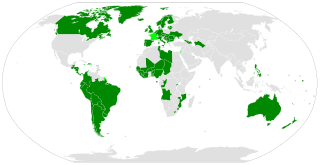
The Convention on the Reduction of Statelessness is a 1961 United Nations multilateral treaty whereby sovereign states agree to reduce the incidence of statelessness. The Convention was originally intended as a Protocol to the Convention Relating to the Status of Refugees, while the 1954 Convention Relating to the Status of Stateless Persons was adopted to cover stateless persons who are not refugees and therefore not within the scope of the Convention Relating to the Status of Refugees.

The Convention Relating to the Status of Stateless Persons is a 1954 United Nations multilateral treaty that aims to protect stateless individuals.
Guy Serle Goodwin-Gill is a barrister and a professor of public international law at Oxford University and a Fellow of All Souls College, Oxford.
The United Nations Fish Stocks Agreement (UNFSA), otherwise known as the Straddling Fish Stocks Agreement is a multilateral treaty created by the United Nations to enhance the cooperative management of fisheries resources that span wide areas, and are of economic and environmental concern to a number of nations. As of December 2016, the treaty had been ratified by 91 parties, which includes 90 states and the European Union.
The Rule of Law in Armed Conflicts Project is an initiative of the Geneva Academy of International Humanitarian Law and Human Rights to support the application and implementation of the international law of armed conflict.
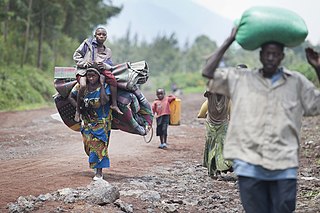
The Kampala Convention is a treaty of the African Union (AU) that addresses internal displacement caused by armed conflict, natural disasters and large-scale development projects in Africa.
